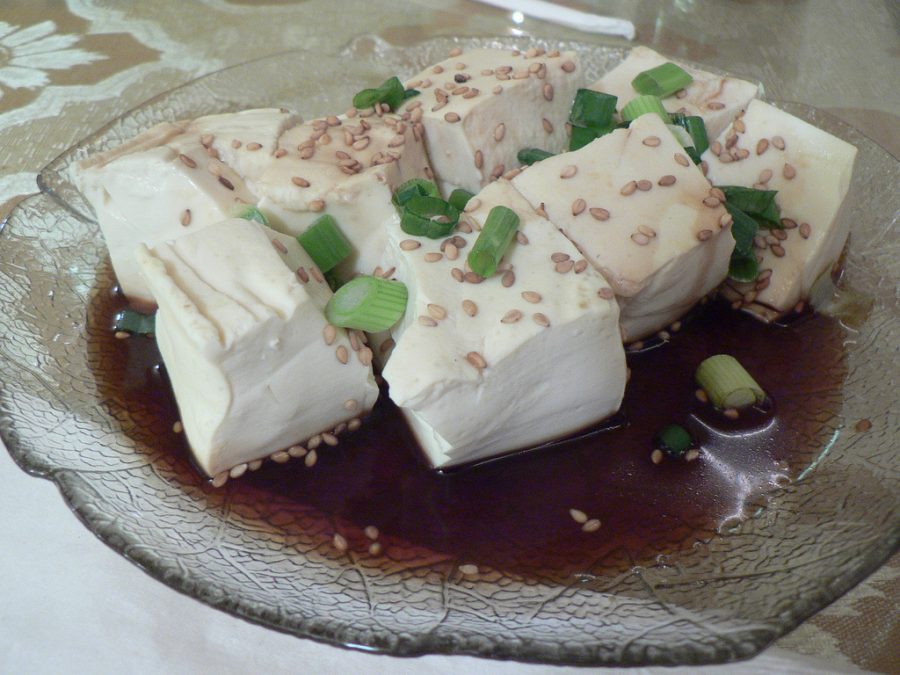Tofu and soymilk are the only substitutions vegans need to make to live their lives, right? I don’t need to eat soy products—I shouldn’t eat soy products—because they raise estrogen levels in my body, and that’s bad, right?
One of the most common rumors recently circulating in health blogs and popular websites is that soy raises your estrogen levels. Many of these articles target men as their audience (raised estrogen levels are associated with decreased secondary male sex traits), but women should take caution too according to the rumors. Excessive levels of estrogen lead to adverse effects for everyone.
But the question this article concerns itself with is specifically whether or not soy causes elevated levels of estrogen in men or women who consume it. The answer seems to be pretty complicated and have several parts, but I will try to break it down.
Soy contains very concentrated amounts of isoflavones—a chemical compound that acts very similarly to estrogen in the human body due to its similar chemical structure. So, while soy may not raise estrogen levels directly, it effectively provides an additional influx of estrogen-like compounds that can perform many of the same functions. But interestingly, isoflavones also have anti-estrogenic effects: They are broken down in the small intestine into other compounds that act either like estrogen or antagonize it, which is why the study of soy’s effects on the human body get complicated quickly.
To add to the complications, each individual’s content of colonic bacteria in the digestive tract varies due to genetic and environmental differences. These variations lead to differences in how isoflavones are processed in the body, influencing how strongly the anti-estrogenic or estrogenic effects are displayed.
So then how does soy influence our hormones on a larger scale? A meta-analysis by Mindy S. Kurzer, a professor in the department of food science and nutrition at the University of Minnesota, looked at several intervention studies and had a hard time coming to a definitive conclusion. Many of the studies looked at the hormonal effects of an additional isoflavone intake. The isoflavone intakes vary anywhere between four and 200 milligrams-a-day (your average cup of soy milk contains six milligrams of isoflavones, while three ounces of tofu contains almost 20).
For pre-menopausal women, the results were not significant but there did seem to be a trend. As participants were given larger doses of isoflavones, their menstrual cycles actually increased (a positive benefit). The average increase in cycle length was just over one day, which does not seem to be very much at all, but there does seem to be just enough of something there to warrant further research. When looking at blood concentrations of estrogen levels, the results are quite inconsistent. Even within the inconsistencies, there seems to be a small trend toward a decrease, not an increase, in blood plasma estrogen levels.
For men, results are also largely inconclusive. One study—titled “Effect of a phytoestrogen food supplement on reproductive health in normal males” by Mitchell et al. (2001)—saw no changes in concentrations of male sex hormones or other markers of reduced male sex traits. Mitchell et al. chose a 40 mg/day dose (used for two months on 12 participants) because most men in Eastern countries consume about 40 mg/day of isoflavones through soy products. But 40 milligrams is about two serving sizes of tofu, or six to seven servings of soy milk, which most American men do not even come close to consuming each day.
Other studies done with male participants, such as the study done by Habito et al. (2000), performed intervention studies that looked at the differences in male hormone changes with doses as high as 70 mg/day of isoflavones. When replacing meat protein with soybean protein, they still saw no statistically significant results.
When looking at health trends, remember that anything in moderation is good, and that anything in excess is bad. After digging through some of the literature, it really seems that moderate soy consumption has little to no effect on our hormone and estrogen levels for both men and women. It is a healthy and safe alternative to meat protein, and if you are not vegetarian, it is more than okay to eat the occasional tofu salad or stir fry.
Nicholas Remillard can be reached at [email protected].





















KL Eckhardt • Apr 23, 2018 at 1:12 pm
Your studies interest me! In 1996, I had a radical hysterectomy as part of a cervical cancer surgery. Afterwards, I was told to stop eating tofu and using soy products because they would upset my hormone balances, which we were working hard to stabilize. (I’m now 68.) There is a product that may benefit me with a bladder control problem, but one of the prime ingredients is soy germ. I’m trying to find out if soy germ would affect my estrogen & other hormone balances.
As someone who also needs to be gluten free, I likewise researched the effects of wheat germ and wheatgrass, or wheatgrass juice powder. I discovered wheat germ was out of my diet forever; however, wheatgrass or wheatgrass juice/powder would not affect me in remaining gluten free.
The main question I have now is How would taking a bladder control supplement which principally contains pumpkin seeds & soy germ affect my estrogen levels?